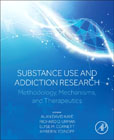
Substance Use and Addiction Research: Methodology, Mechanisms, and Therapeutics
Kaye, Alan David
Urman, Richard D.
Substance Abuse and Addiction Research: Methodology, Mechanisms, and Therapeutics is an up-to-date, comprehensive, practical book on the research methodology for substance abuse and addiction intended for researchers and consumers of research information at all levels. The book is divided into 4 major sections: Introduction; Research Methodology for clinical trials, animal research and retrospective studies; Mechanisms of Abuse and Addiction; and Investigative Therapeutics: Designing and Measuring Outcomes. It serves a source that addresses all aspects of research design, methods and analysis within the context of the field of opioids, alcohol and other substances. The book discusses in detail the research methods used in designing prevention, screening, pharmacological management and health services needed for substance abuse and addiction of all major illicit and prescribed drugs, foods, alcohol, and tobacco products. Research design and useful tips are provided for researchers and consumers of the literature, describing various biological models, specialist and analytical methods. The background on the development of the discipline in question, its key features and applications, how the methods compare to other methods/analyses and their advantages and limitations. The book covers what is known in the field of quantitative and qualitative research methods, provide future directions and introduce new models for investigation. It is organized around a translational science framework, and the contents addresses substance use/addiction research in the context of epidemiology, etiology, intervention efficacy and effectiveness, and implementation of evidence-informed interventions. Most chapters will also include specific examples/case studies so that the reader can apply the knowledge to formulating a plan to solve an actual research question. With a focus on translational science, a discussion of specific drugs that are commonly abused is included, such as opioids, club drugs, cocaine, marijuana, amphetamines, alcohol, and tobacco. The study of both conventional and nonconventional techniques is described, including psychotherapy. The expansion of non-pharmacological therapies such as hypnosis, music therapy, relaxation, hypnosis, and transcutaneous nerve stimulation will also be described. This practical guide on substance use/addiction research will be of value to experienced researchers as well as those new to the field. It will explore various approaches to study design in animal and human models, participant recruitment and retention, measurement and analysis, and the processes involved in the dissemination, diffusion, and implementation of evidence-informed innovations. Above all, the book has plenty of references and existing technical resources and measurement tools that the reader can utilize in their work. Practical, easy to read text designed to appeal to both experienced and beginner researchers in the field of substance abuse/addiction science A concise, well-organized handbook, which is a complete guide to methodology in conducting substance abuse/addiction research Contributors include experts from leading academic institutions Ample diagrams, tables and figures to help organize the information for easy reference, along with a list and explanation of existing useful measurement tools, websites, statistical methods, and other resources Sample case studies and proposed approaches to solidify knowledge and demonstrate real-life research problems; both animal and human study designs and methods are discussed INDICE: Basics of Research Methodology 1. Reliability and validity in substance abuse and addiction research2. Animal models3. Translational research strategies4. Experimental design in clinical trials Part 15. Experimental design in clinical trials Part 26. Qualitative and quantitative methods7. Ethical issues in opioids, alcohol, other drugs and addiction-related research: 8. Informatics9. Artificial intelligence and machine learning10. Epidemiology and health services research methods11. Imaging 12. Systematic review and meta-analysisMechanisms of abuse and addiction 13. Abuse and addiction14. Assessment of addiction/pain and neurobiology15. Physiological considerations in opioid addiction16. Basic pharmacology - opioid substances17. Basic pharmacology - non-opioid substances18. Types of addiction19. Substance use 20. Special study populationsInvestigative Therapeutics: Designing studies and measuring outcomes21. General therapy strategies in substance addiction22. Alternative Therapy Strategies in Addiction23. Drug testing and adherence monitoring24. Pharmacogenetics - Genes, genetics, genomics and epigenetics25. Novel therapeutic strategies effectiveness26. Methods of psychosocial interventions27. Principles of vaccine development28. Drug policy analysis29. Implementation science: Theories, models and frameworks30. Designing and testing population-based prevention programs31. New vistas in research
- ISBN: 978-0-323-98814-8
- Editorial: Academic Press
- Encuadernacion: Rústica
- Páginas: 500
- Fecha Publicación: 01/01/2023
- Nº Volúmenes: 1
- Idioma: Inglés
